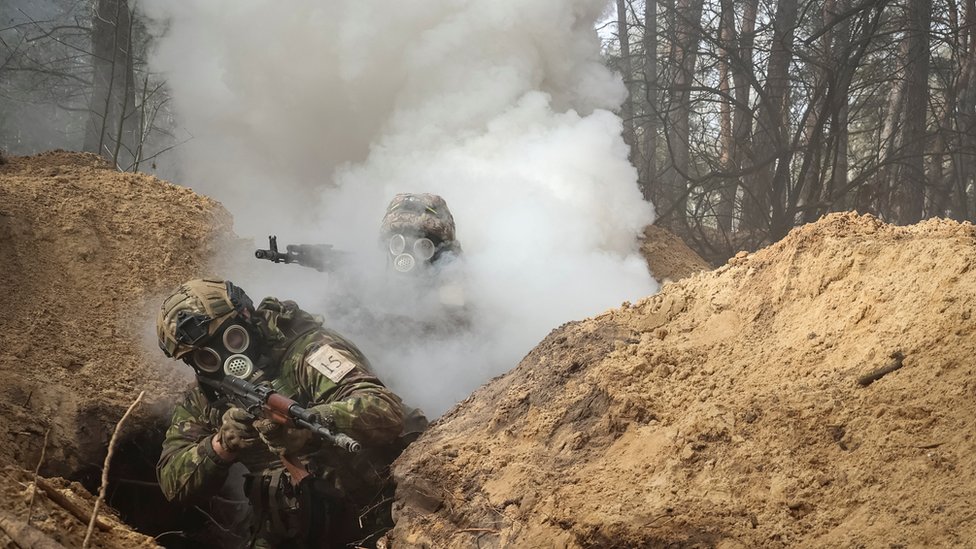A new intelligence report from European security agencies has delivered a shocking blow to the ongoing Russia-Ukraine conflict.
Shocking Intelligence Uncovers Use of Chemical Weapons
The report, jointly released by Dutch and German intelligence services—including the MIVD, AIVD, and Germany’s BND—states that Russia is now using banned chemical weapons on the battlefield in Ukraine. These findings mark a serious and dangerous turn in the war, adding new layers of concern for the international community.
According to the intelligence gathered, Russian forces have used chloropicrin, a chemical that is not only harmful but also banned under the 1993 Chemical Weapons Convention (CWC). This substance can cause severe breathing problems and is considered potentially lethal. The use of chloropicrin in combat situations violates international law and the chemical warfare agreement to which Russia is still a signatory.
But the issue goes beyond chloropicrin alone. The report claims that Russia has also been using non-lethal chemical agents like tear gas—not just to disable soldiers temporarily, but as a way to set the stage for more dangerous substances. This practice of mixing both non-lethal and lethal chemicals in warfare points to a growing and systematic strategy.
Assad Faces Second Devastating Arrest Warrant from France for War Crimes
Intelligence suggests that this is not an isolated act. Instead, it appears to be a coordinated plan, with the involvement of high-level military command structures in Russia. This coordination shows that the use of chemical weapons is not just a tactical move on the ground but part of a larger and ongoing policy.
Chemical Warfare Becoming “Standard Practice”
The language used in the report is alarming. According to the European agencies, chemical warfare has now become “standard practice” for Russian troops. Russian forces are not using these banned and dangerous weapons in rare or extreme cases—they are making them a routine part of military operations.
This development is deeply concerning because it breaks long-held international norms. After the horrors of World War I and other conflicts, countries around the world agreed to ban chemical weapons through treaties like the Chemical Weapons Convention. World leaders created this global agreement to stop the use of toxic gases and chemicals in warfare forever.
Sudan Hit by Severe US Action Following Gruesome Chemical Weapon Use
However, the new report shows that Russia is now openly ignoring these agreements. This move not only threatens Ukraine and the region—it signals that chemical weapons could once again become a regular part of how countries fight wars worldwide.
The repeated use of these substances also suggests that Russian forces may be investing in expanding their chemical weapon capabilities. The intelligence documents indicate that there are efforts underway to develop more of these materials and possibly create new delivery systems for them. This raises further alarms about the direction the war is heading and the seriousness of the threat.
NATO’s Response to Chemical Weapons Violations
The reaction from NATO and the global community has been one of immediate concern. The alliance is treating this information with the highest level of seriousness. NATO officials have pointed out that the use of chemical weapons is not just a regional issue—it challenges the very foundation of global agreements meant to protect civilians and military personnel from inhumane warfare.
What makes this situation more disturbing is that Russia is still officially a signatory of the Chemical Weapons Convention. By using banned substances like chloropicrin, Russia is violating its own international promises. This has caused diplomatic outrage and could lead to significant responses from countries around the world.
NATO Launches Air Response After Dangerous Russian Drone Strikes
In addition to the direct effects of these weapons—such as injuries and deaths—there is also the psychological impact. Civilians and soldiers now face the fear of invisible and unpredictable attacks, which adds to the already severe toll of the conflict.
The intelligence community has emphasized that this pattern must be watched closely. They note that the combination of non-lethal and lethal chemical agents in battlefields is highly unusual and extremely dangerous. It may signal the beginning of a shift in how modern wars are conducted.

